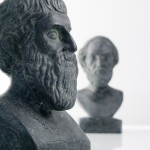I was going through some old graduate school materials this weekend and came across notes from a Psychology of Music class. Dr. Michael Thaut (Colorado State University) began the class by highlighting how “great minds” in society viewed music and the purpose of music.
Using music solely for entertainment is a relatively new idea. Historically, mathematicians and philosophers have used music as a model for studying the laws of the universe or expounding it’s virtues as an educational tool. And this does not even touch on the use of music and dancing in healing and meditation.
So here are some of my notes. Happy reading!
Pythagoras, Greek Mathematician
Pythagoras, famous for the Pythagorean Theorem (or A2+B2=C2), studied the acoustics of music and used those principles as a model for studying the physical laws of the universe. For example, he noted that cutting a vibrating string in half makes it vibrate twice as quickly and sound one octave higher. He investigated several of these harmonic relationships and postulated that planetary motions followed these same relationships.
 Plato, Greek Philosopher and Mathematician
Plato, Greek Philosopher and Mathematician
Plato wrote The Republic, a milestone work that serves as an introduction to philosophy. In The Republic, he addresses core subjects he viewed necessary for a person’s education: sports (for the body) and music (for the mind).
Aristotle, Greek Philosopher
Aristotle can be considered the first major empiricist, believing that we learn from experiences. He abhorred music performances, but believed that all youth should study music
Boethius, Medieval Philosopher
Boethius coined three terms he used to describe different roles of music:
- Musica Mundana (or “music of the world”): As Pythagoras did, music can be used as a model for studying and understanding the world and the laws of nature.
- Musical Humana: As Plato and Aristotle believed, music should be used as a tool for virtue training and education.
- Musica Instrumentalis: The lowliest of the three roles, using music for entertainment purposes.
Kepler, Renaissance Mathematician and Astronomer
Kepler wrote De Harmonius Mundi ( or “About the Harmonies of the Universe”), which again follows much of the same logic as Pythagoras and Boethius. Kepler hypothesized the elliptical ratios of a planet’s orbit are low integer ratios and that these same ratios are reflected in the harmonies of music.
Leibniz, German Mathematician
Leibniz said: “Listening to music is an exercise in subconscious mathematical equations in the brain.” when the physical laws and acoustical aspects of music are considered, this quote is entirely true.
Schopenhauer, German Philosopher
Schopenhauer believed that music is a reflection of “perfect ideas” such as love, hope, and will. These perfect ideas can only be achieved by philosophical exercises of the mind, bu are reflected purely in music.
So, are there more?


 orcid.org/0000-0001-8665-1493
orcid.org/0000-0001-8665-1493






{ 1 comment… read it below or add one }
great article
You must log in to post a comment.
{ 1 trackback }